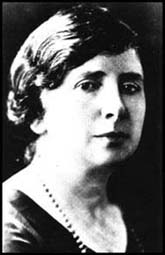ROSE SCHNEIDERMAN (1882-1972)
 Rose Schneiderman was born in
Poland in 1882, and her family emigrated to New York when she was eight years
old. Although she never married, she was one of the most influential women in
the Labor Movement for the first half of the 20th century. Her career was
marked by high profile appointments as labor advisor to U.S. government
agencies, including a culminating position as the first woman appointed to the
Labor Advisory Board by Franklin Roosevelt.
Rose Schneiderman was born in
Poland in 1882, and her family emigrated to New York when she was eight years
old. Although she never married, she was one of the most influential women in
the Labor Movement for the first half of the 20th century. Her career was
marked by high profile appointments as labor advisor to U.S. government
agencies, including a culminating position as the first woman appointed to the
Labor Advisory Board by Franklin Roosevelt.
Rose's childhood; however, was typical of young women growing up on the Lower
East Side. Her father died when she
was ten years old and her mother was "Forced to work in a factory" at which time
she "did the only thing she could do, she sent her children to an orphanage." (Taitz,
p. 137) At thirteen, Rose was considered old enough to work, and her first
job was as an errand girl in a department store. "She worked sixty-four hours a
week and received a wage of $2.16." (Taitz, p.137) Her third job was in a
factory making hats. She knew that factory work paid a better wage. Fortunately,
with the wages she earned in the factory, she was able to reunite her family so
her mother could stay at home with the younger children once again.
In 1903, at the age of 21, Rose organized the first female local within the
United Hat and Cap Makers Union. "Having grown up in the factories, Rose knew
how bad conditions were, especially for young women. Factory owners charged each
worker for the supplies she used in her work. Workers had to pay for thread,
machines, even electricty. (Taitz, p. 138)
Rose was also active in the suffrage movement, she "even argued before
President Wilson, insisting: 'The vote, Mr. President, is a necessity.' In
answer to the charge that women would 'lose their beauty and purity if they
voted,' (Taitz, p. 139) Rose said:
"We have women working in foundries stripped
to the waist . . . [other women] stand for thirteen or fourteen hours in the
terrible steam and heat with their hands in hot starch. Surely these women won't
lose any more of their beauty and charm by putting a ballot in a ballot box once
a year than they are likely tolose standing in foundries or laundries all year
round."
By 1918, Rose Schneiderman was one of the most outspoken
and active women in the Women's Labor Movement. Her commitment to fair
wages and improved working conditions for women made her one of the most notable
spokespersons for the working class, particularly working class women.
WEBLINKS
Related biography links
http://www.spartacus.schoolnet.co.uk/USAschneiderman.htm
http://historymatters.gmu.edu/d/5480/
http://www.nps.gov/elro/glossary/schneiderman-rose.htm
RELATED LITERATURE
Ashby, Ruth and Ohrn, Deborah, eds. Herstory: Women who Changed the World.
New York, NY: Viking, 1995.
Sachs, Marilyn. Call Me Ruth. NY: Doubleday, 1982.
 Rose Schneiderman was born in
Poland in 1882, and her family emigrated to New York when she was eight years
old. Although she never married, she was one of the most influential women in
the Labor Movement for the first half of the 20th century. Her career was
marked by high profile appointments as labor advisor to U.S. government
agencies, including a culminating position as the first woman appointed to the
Labor Advisory Board by Franklin Roosevelt.
Rose Schneiderman was born in
Poland in 1882, and her family emigrated to New York when she was eight years
old. Although she never married, she was one of the most influential women in
the Labor Movement for the first half of the 20th century. Her career was
marked by high profile appointments as labor advisor to U.S. government
agencies, including a culminating position as the first woman appointed to the
Labor Advisory Board by Franklin Roosevelt.